© European Union
“Moldova belongs in the European Union,” its President, Maia Sandu, told MEPs during an address to the European Parliament in May. She urged EU member states to rally behind her country’s bid to join the club. There’s little doubt that most MEPs agree with her, too; just a couple of weeks before Sandu’s visit, the Parliament adopted a resolution to agree that the EU should provide macro-financial assistance to Moldova and that it should be integrated into the single market straight away. It also expressed serious concern over developments in the breakaway territory of Transnistria, whose self-proclaimed independence from Moldova is only recognised by Russia and her closest allies. The Parliament’s ready acceptance of a proposal to help Moldova on its path towards full membership owes much to Russia’s brutal invasion of neighbouring Ukraine. The resolution stated that Moldova had been disproportionately affected by the war next door. Some 450,000 Ukrainian refugees have entered the country and almost 100,000 are still there, half of them children. Moldova is also suffering from a loss of trade and a steep rise in the cost of energy and transport.
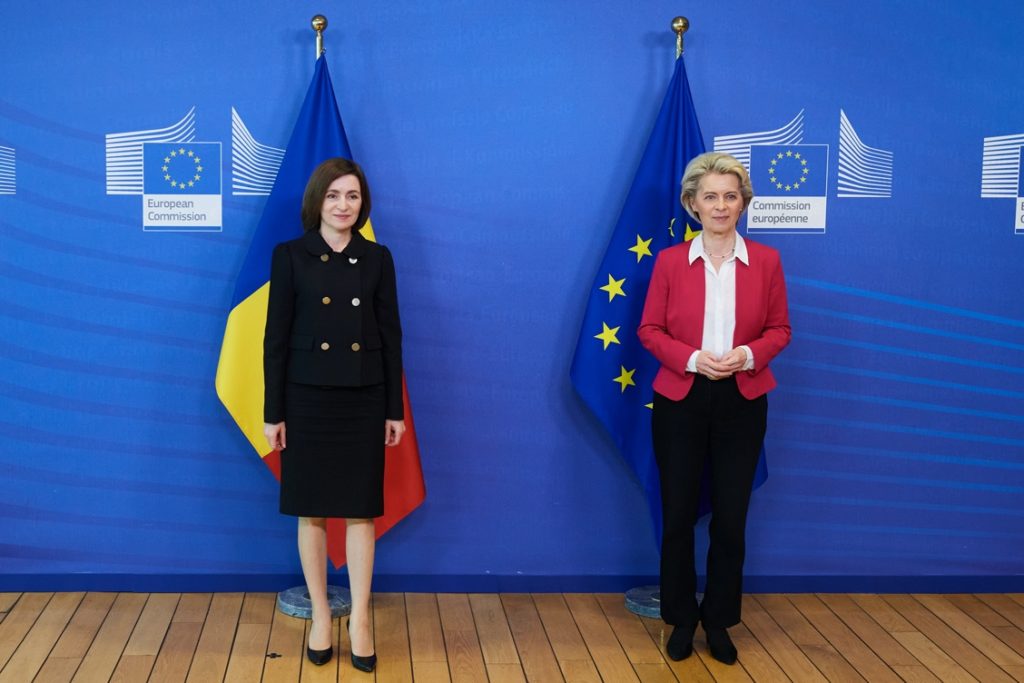
Moldova made a formal application to join the bloc on 3 March this year. After addressing MEPs, Sandu reminded journalists of her country’s place within the Union. “Moldova is a European country, with a European history and it will certainly have a European future,” she said. Certainly, that is far more the case for Moldova itself than for the backward-looking region of Transnistria, sometimes described as “the world’s largest open-air museum, a place where the Soviet Union never collapsed”. With its own (unrecognised) government, currency (which can only be spent in Transnistria), flag (bearing the hammer and sickle emblem), police and armed forces, it is a region that looks to the past. Statues of Lenin are easy to find there, but that means nothing: I have a small bronze bust of him on my desk, too, a memento of a working trip to Eastern Europe long, long ago. Moldova, however, has the highest proportion of Ukrainian refugees anywhere, for the size of its own population.
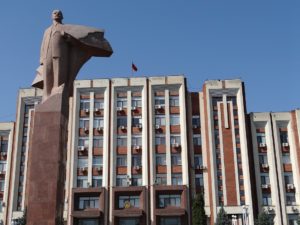
In an article for The Big Issue, an excellent UK magazine sold to raise funds for Britain’s homeless, Steven MacKenzie points out that the city shown on maps as Tiraspol, the second largest city in Moldova after the capital, Chișinău, is known by its residents as the capital of what they call the Pridnestrovskaia Moldavskaia Respublica, although normally referred to as Transnistria, “for reasons as complicated as the former name’s pronunciation,” MacKenzie explains. The region, during its history, has been variously conquerted and taken over by Romania, Turkey (twice) and Sweden, each time being liberated by Russia, which may explain the Transnistrians’ fondness for the place.
“We speak one of the EU official languages,” Sandu reminded the press conference (it’s Romanian, by the way), “and our people have repeatedly shown how committed they are to freedom and democracy, when they fought anti-democratic abuse in our country and started a huge reform programme aimed at consolidating state institutions, at boosting the economy, reforming the judiciary, boosting the capacity of our corruption-fighting institutions. We want to build a country where our citizens can catch a glimpse of their future.” Sandu clearly hopes – as do all Moldovans – that the future is going to be both European and peaceful, although there are danger signs. Russian President Vladimir Putin has talked about creating a “new Russia” (Novorossiya), which would basically restore the pre-1989 borders: Putin’s “legacy”, perhaps? He has tanks, planes and helicopters in Transnistria and there have been claims that he has drawn up plans to invade Moldova from there. He also wants to isolate Ukraine from the Black Sea and the Sea of Azov, effectively cutting it off, according to Ukraine’s Deputy Defence Minister, Anna Malyar.
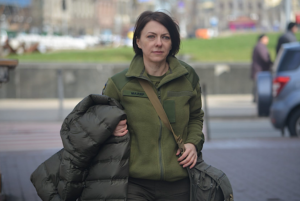
For Putin, nationalism is linked to his supposed religious faith; he is said to pray frequently in a small chapel beside his office in the Kremlin. Both his mother and wife were devoted Christians and members of the Orthodox church. The Church itself seems to support the sort of nationalism Putin epitomises. It helps Putin retain his popularity at home: surveys have shown that the Russian people trust the Orthodox church more than any other public institution, including the law courts, trades unions, mass media, the police and the government. This suits Putin very well. His displays of faith, it has been noted, may also soften the antipathy towards him on the part of America’s highly influential religious right.
For Moldova, whatever Putin’s long-term goals (and however unrealisable they are in reality) his invasion of Ukraine has come as a shock. “The EU is our main economic and development partner,” Sandu told journalists.
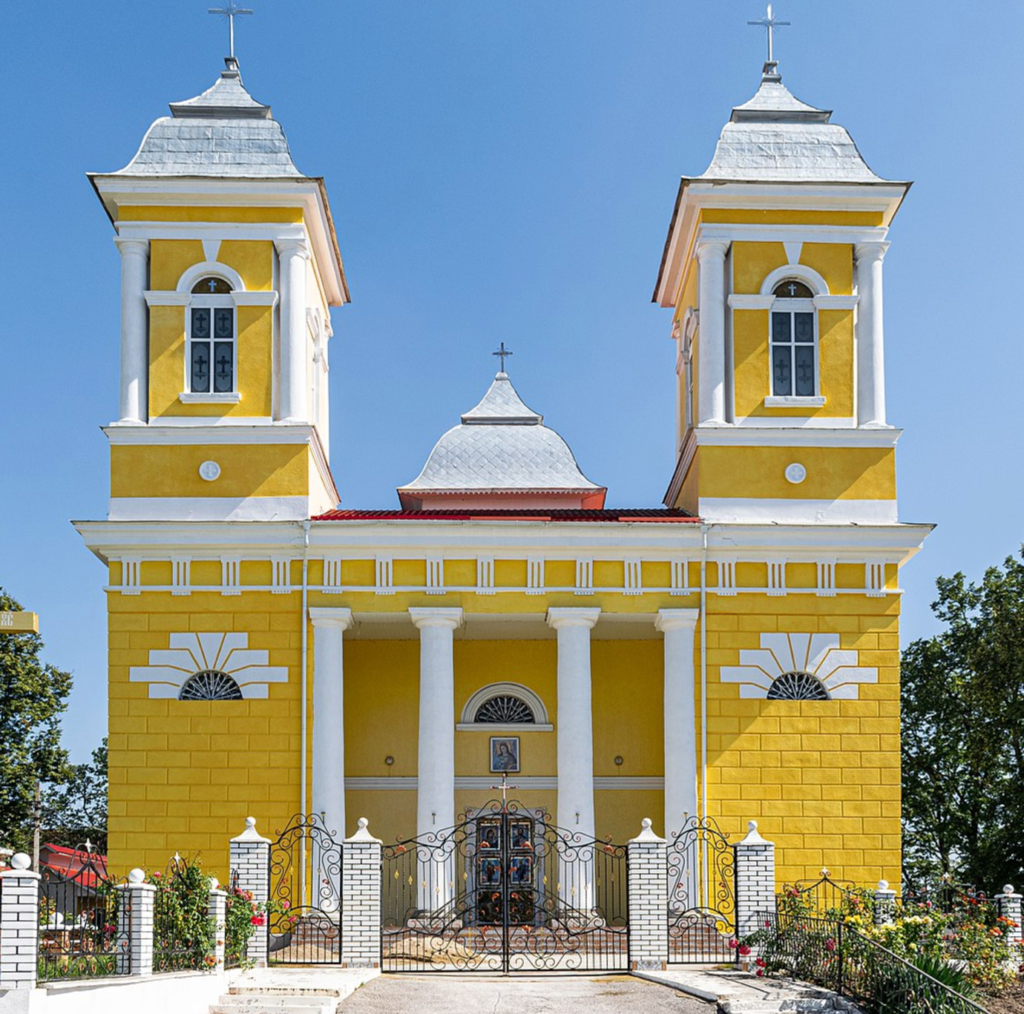
“The war in Ukraine has brought instability and uncertainty in the region,” she said, “but also an opportunity to rebuild the continent based on fairer rules. We need to be decided, if we want the Republic of Moldova to be secure and to develop.” The answer would seem to be obvious enough, but it will take a serious effort, because Russian criminal gangs have been using Moldova to launder dirty money in a massive operation, seemingly supported by Russia itself.
It became known as “the Russian Laundromat”, and it involved Russian figures and groups moving some $20-billion (€19-billion) through Moldova’s Moldindconbank over a 5-year period. Court orders issued in Moldova then “cleaned” the money by supporting fraudulent claims that borrowers had defaulted on promissory notes. The proceeds were then moved to Latvia or even further afield, where they disappeared. The actual sums involved may have been much higher. In 2017, Britain’s ‘The Guardian’ newspaper reported that Moldovan law enforcement officials believed the total amount laundered may have been as high as $80-billion (€76-billion). There was also widespread belief that Moldova had done too little to halt the activity. This particular route for laundering cash may be blocked now but the Russian government continues to seek out small, vulnerable economies to facilitate its illegal operations and those of its criminal gangs. As the German Marshall Fund of the United States reports on its website: “small jurisdictions matter”. That’s because nobody notices what happens there.
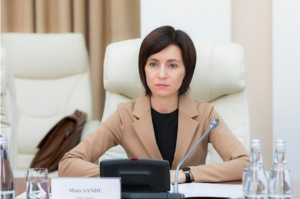
Sandu was asked at her press conference about the issue. “We know that some of this money went through banks in countries that are now democracies,” she told the journalists. “Some of this money, some of these corruption cases, involved shell companies. We do know that some of the corrupt people in Moldova managed to buy properties even in EU countries, using the stolen money from Moldova, so my request is to have a joint common effort not to allow for the money stolen, especially for the money stolen from fragile democracies, to be used by these crooks in nice countries where they enjoy good public services and where they’re trying to hide the money that they’ve stolen.” Criminal gangs are always one jump ahead of the law, but Sandu thinks by working together their lives can be made more uncomfortable.
“Membership of the EU is the only path that we have to be part of the free world,” Sandu said at her press conference. She admitted that joining would take time. “We’re not naïve. We believe that EU integration for our country will be a lengthy and intricate process that will demand a lot of work on our part. We’re not looking for shortcuts; we are ready to do our homework.”
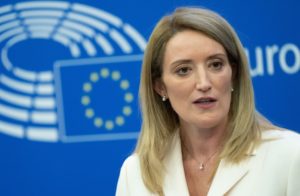
Asked by a Moldovan journalist if Europe was united in its welcoming attitude, Roberta Metsola, the Parliament president, said that it is, and emphatically so. “It is a full house,” Metsola replied, “We support Moldova, just like we support Ukraine and Georgia on their European path. Our doors are open, just as they are for any country whose values and fundamental principles we share. The European Parliament will continue to do our utmost.”
Another journalist, this time from Latvia, asked Sandu if hers and other Baltic states had anything to fear from Russia’s war spreading across their borders. “A lot of our people in our country are afraid of it,” she said. “It’s alright to be concerned when a neighbouring country decides to attack its neighbour, and a lot of us are concerned,” Sandu replied, but offered some reassurance: “We do believe that the Baltic countries are in a safer environment, because they are part of the EU, because they have the NATO security umbrella, but of course this war presents a big threat to all of us, especially Croatia.” That may be why the Parliament, the day after Sandu’s visit, urged the European Council to open membership negotiations with Albania and North Macedonia.
Only time will tell if Sandu’s pessimism or optimism will triumph in the end. Putin continues to drum up support for membership of both the EU and NATO, and we all know that is the last thing he intends. What he wants is to bring the nations he sees as co-religionists of the Russian Orthodox Church together under his umbrella. In the view of Bishop Kirill of Moscow, Patriarch of the Russian Orthodox Church, the Church’s official doctrine is to build ‘a national identity’, uniting the Russians, Ukrainians and Belarusians together in their shared Orthodox belief. Kirill blessed the Russian army and gave his blessing for the war before the invasion, which he described as “a special peacekeeping mission”. It hasn’t seemed very peaceful to the rest of the world. If unifying the Orthodox-following countries is Putin’s aim, he seems to have adopted a thoroughly un-Christian way to achieve it, although not according to Kirill.
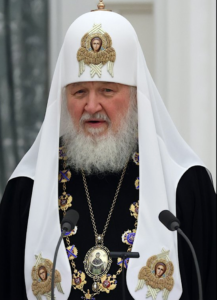
He has turned a blind eye to Russian atrocities, saying, bizarrely: “Russia has never attacked anyone,” which will come as news to the relatives of the many Ukrainian citizens Russian forces have slaughtrered. He said that in a sermon while Russian bombs and shells were falling on Kyiv, Kharkiv and Mariupol. He seems to think it’s all a spiritual exercise in which no-one is ever hurt.
“We have entered into a struggle that has not a physical, but a metaphysical significance,” he has said. So, Putin is safe; his soul is secure, in Kirill’s view. Whatever happened to the 6th Commandment: “Thou shalt not kill?” We may never know, but the European Parliament wants a special international tribunal to examine crimes of aggression: “Perpetrators of war crimes must be brought to justice,” it says.
Kirill is unlikely to agree, but then, he’s Putin’s friend.

